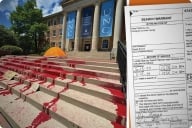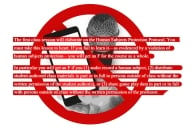You have /5 articles left.
Sign up for a free account or log in.
A freshman at Reed College ignited a fast-spreading free speech debate with a story about his removal from a class discussion because his comments -- especially those about rape -- made other students uncomfortable. Yet others at Reed said the student was making it difficult for class discussions to take place for reasons far removed from his views.
Jeremiah True said in a letter to Reed faculty members that he was removed from the discussion section of his Humanities 110 course after sharing unpopular opinions on the frequency of sexual assault. He had argued against the statistic that one in five women are sexually assaulted, and he says he didn’t intend to offend people and wasn’t aggressive in any way.
The professor, Pancho Savery, described a different scenario. True was not banned from the class for what he said, but rather as a result of a series of disruptive behaviors, Savery said. He declined to elaborate on the behaviors.
True declined to be interviewed Thursday. When contacted via e-mail, he responded that he would only answer questions if the first word in the article was “nigger.” Inside Higher Ed refused to make such a commitment, and he then declined to talk.
True described himself in the letter to faculty members as quite vocal in class and as someone who’s not afraid to share his opinion. He wrote that he tried to monitor his behavior in class -- and thought he was doing so successfully -- after being told by Savery that other classmates felt he was making sexist comments.
But last week, Savery held a class meeting at which True wasn’t present. The rest of the students talked about the classroom environment.
More than one student in the class had told Savery that they’d been sexually assaulted, and both male and female students complained about True’s behavior.
“You have made them extremely uncomfortable with what they see as not only your undermining incidents of rape, but of also placing too much emphasis on men being unfairly charged with rape,” Savery wrote to True.
The exchange comes from a series of e-mails that True copied into his letter to faculty. Only the text of the e-mails is visible and not the addresses, dates or times.
Savery told True that he had to do what was best for the well-being of the class, and so True was banned from the discussion section.
“Please know that this was a difficult decision for me to make and one that I have never made before; nevertheless, in light of the serious stress you have caused your classmates, I feel that I have no other choice,” Savery wrote.
All freshmen at Reed, a liberal arts college in Oregon, take the humanities course. A college spokesman said True was not banned from the entire lecture but only from the small breakout session.
True was offered the option to transfer into a different section, and he also was offered the opportunity to meet one-on-one with Savery, said Kevin Myers, director of strategic communications. He declined both of those offers.
While some accounts of the story have described True’s sexual assault comment as a onetime occurrence, Myers stressed that it was a continual issue in the course. True was removed not for the content of his speech but because of the context, he said.
While it’s very rare, faculty members have the right to remove anyone whose behavior is interrupting the abilities of other people to learn, he said.
“When a student’s behavior disrupts that environment substantially, then we have an obligation to act,” Myers said.
Much of True's letter to faculty is a lengthy explanation of the work he did to research sexual assault statistics and to investigate how Reed counts sexual assault.
“I think it’s important to treat rape seriously, and not to overinflate it and cause panic,” he said. “I think it’s important to listen to experts when we’re talking about these things, and not college students.”
He writes that a groping is not rape and it shouldn't be redefined to become rape, likely referring to the oft-cited study the one in five statistic comes from. That study has been criticized because of its limited survey pool and broad definition of assault.
True also wrote that some members of his class have since told him that they didn’t think he should be banned, but that there was a “loud minority” of students who did.
Students interviewed by the student newspaper and BuzzFeed defended Savery and the decision to remove True.
“I’m really comforted by the administrative response,” junior Kate Hilts told BuzzFeed. “It’s really nice to know that my school supports survivors and listens when they say they don’t feel safe.”
One student also described other classroom discussions of class and race in which True spoke in a way that made others uncomfortable, such as saying racists shouldn't be blamed for their actions if they weren't taught anything different. (True notes in his letter to faculty members that he is black.)
But the number of signatures on an online petition in support of True has skyrocketed since the story was first reported Thursday. True asks to be allowed to return to his class, and that he "will do what is necessary to make a statement." As of Thursday night, there were more than 1,500 signatures.
The Foundation for Individual Rights in Education (FIRE) is investigating the case to determine whether True’s removal violates free speech, though, as a private college, Reed isn’t bound by the First Amendment.
Without knowing the exact content of the comments or the way they were expressed, it’s difficult to say definitely whether True’s comments were appropriate use of speech, said Ari Cohn, a free-speech attorney with FIRE.
The comments would have to constitute actual harassment to be inappropriate, and the U.S. Supreme Court has set a pretty high bar for harassment, Cohn said. In Davis v. Monroe County Board of Education, the court decided that the speaker's conduct must effectively block others' access to educational opportunity or benefit.
“The mere fact that somebody says something that makes you feel uncomfortable or that you don’t agree with isn’t in and of itself harassment,” Cohn said.
Myers, the Reed spokesman, said the college was working to find a solution that satisfies everyone. True is an intelligent student who has strong ideas and isn’t afraid to question things, he said.
“There’s room for that at a place like Reed College -- to have an opinion even when it’s uncomfortable,” he said. “But you also have to have respect for your fellow students and share those opinions at a time that’s appropriate.”








